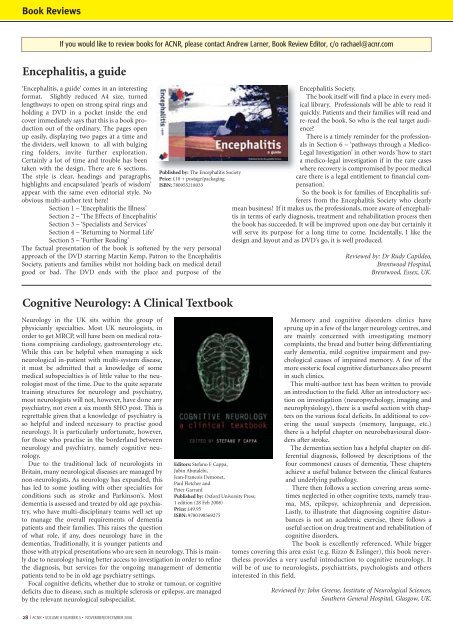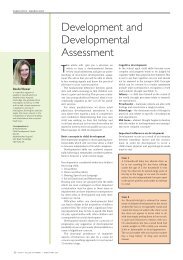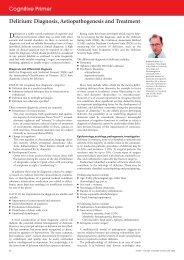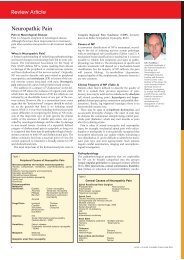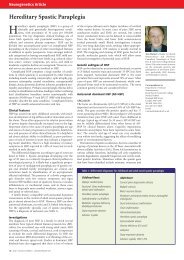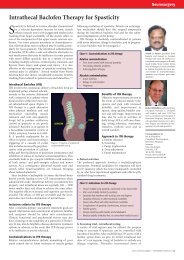Unn Ljøstad and Åse Mygland Jone Furlund Owe and Nils ... - ACNR
Unn Ljøstad and Åse Mygland Jone Furlund Owe and Nils ... - ACNR
Unn Ljøstad and Åse Mygland Jone Furlund Owe and Nils ... - ACNR
Create successful ePaper yourself
Turn your PDF publications into a flip-book with our unique Google optimized e-Paper software.
Book Reviews<br />
If you would like to review books for <strong>ACNR</strong>, please contact Andrew Larner, Book Review Editor, c/o rachael@acnr.com<br />
Encephalitis, a guide<br />
‘Encephalitis, a guide’ comes in an interesting<br />
format. Slightly reduced A4 size, turned<br />
lengthways to open on strong spiral rings <strong>and</strong><br />
holding a DVD in a pocket inside the end<br />
cover immediately says that this is a book production<br />
out of the ordinary. The pages open<br />
up easily, displaying two pages at a time <strong>and</strong><br />
the dividers, well known to all with bulging<br />
ring folders, invite further exploration.<br />
Certainly a lot of time <strong>and</strong> trouble has been<br />
taken with the design. There are 6 sections.<br />
The style is clear, headings <strong>and</strong> paragraphs,<br />
highlights <strong>and</strong> encapsulated ‘pearls of wisdom’<br />
appear with the same even editorial style. No<br />
obvious multi-author text here!<br />
Section 1 – ‘Encephalitis the Illness’<br />
Section 2 – ‘The Effects of Encephalitis’<br />
Section 3 – ‘Specialists <strong>and</strong> Services’<br />
Section 4 – ‘Returning to Normal Life’<br />
Section 5 – ‘Further Reading’<br />
Published by: The Encephalitis Society<br />
Price: £10 + postage/packaging<br />
ISBN: 780955218033<br />
The factual presentation of the book is softened by the very personal<br />
approach of the DVD starring Martin Kemp, Patron to the Encephalitis<br />
Society, patients <strong>and</strong> families whilst not holding back on medical detail<br />
good or bad. The DVD ends with the place <strong>and</strong> purpose of the<br />
Encephalitis Society.<br />
The book itself will find a place in every medical<br />
library. Professionals will be able to read it<br />
quickly. Patients <strong>and</strong> their families will read <strong>and</strong><br />
re-read the book. So who is the real target audience?<br />
There is a timely reminder for the professionals<br />
in Section 6 – ‘pathways through a Medico-<br />
Legal Investigation’ in other words ‘how to start<br />
a medico-legal investigation if in the rare cases<br />
where recovery is compromised by poor medical<br />
care there is a legal entitlement to financial compensation’.<br />
So the book is for families of Encephalitis sufferers<br />
from the Encephalitis Society who clearly<br />
mean business! If it makes us, the professionals, more aware of encephalitis<br />
in terms of early diagnosis, treatment <strong>and</strong> rehabilitation process then<br />
the book has succeeded. It will be improved upon one day but certainly it<br />
will serve its purpose for a long time to come. Incidentally, I like the<br />
design <strong>and</strong> layout <strong>and</strong> as DVD’s go, it is well produced.<br />
Reviewed by: Dr Rudy Capildeo,<br />
Brentwood Hospital,<br />
Brentwood, Essex, UK.<br />
Cognitive Neurology: A Clinical Textbook<br />
Neurology in the UK sits within the group of<br />
physicianly specialties. Most UK neurologists, in<br />
order to get MRCP, will have been on medical rotations<br />
comprising cardiology, gastroenterology etc.<br />
While this can be helpful when managing a sick<br />
neurological in-patient with multi-system disease,<br />
it must be admitted that a knowledge of some<br />
medical subspecialties is of little value to the neurologist<br />
most of the time. Due to the quite separate<br />
training structures for neurology <strong>and</strong> psychiatry,<br />
most neurologists will not, however, have done any<br />
psychiatry, not even a six month SHO post. This is<br />
regrettable given that a knowledge of psychiatry is<br />
so helpful <strong>and</strong> indeed necessary to practise good<br />
neurology. It is particularly unfortunate, however,<br />
for those who practise in the borderl<strong>and</strong> between<br />
neurology <strong>and</strong> psychiatry, namely cognitive neurology.<br />
Due to the traditional lack of neurologists in<br />
Britain, many neurological diseases are managed by<br />
non-neurologists. As neurology has exp<strong>and</strong>ed, this<br />
has led to some jostling with other specialties for<br />
conditions such as stroke <strong>and</strong> Parkinson’s. Most<br />
dementia is assessed <strong>and</strong> treated by old age psychiatry,<br />
who have multi-disciplinary teams well set up<br />
to manage the overall requirements of dementia<br />
patients <strong>and</strong> their families. This raises the question<br />
of what role, if any, does neurology have in the<br />
dementias. Traditionally, it is younger patients <strong>and</strong><br />
Editors: Stefano F Cappa,<br />
Jubin Abutalebi,<br />
Jean-Francois Demonet,<br />
Paul Fletcher <strong>and</strong><br />
Peter Garrard<br />
Published by: Oxford University Press;<br />
1 edition (28 Feb 2008)<br />
Price: £49.95<br />
ISBN: 9780198569275<br />
those with atypical presentations who are seen in neurology. This is mainly<br />
due to neurology having better access to investigation in order to refine<br />
the diagnosis, but services for the ongoing management of dementia<br />
patients tend to be in old age psychiatry settings.<br />
Focal cognitive deficits, whether due to stroke or tumour, or cognitive<br />
deficits due to disease, such as multiple sclerosis or epilepsy, are managed<br />
by the relevant neurological subspecialist.<br />
Memory <strong>and</strong> cognitive disorders clinics have<br />
sprung up in a few of the larger neurology centres, <strong>and</strong><br />
are mainly concerned with investigating memory<br />
complaints, the bread <strong>and</strong> butter being differentiating<br />
early dementia, mild cognitive impairment <strong>and</strong> psychological<br />
causes of impaired memory. A few of the<br />
more esoteric focal cognitive disturbances also present<br />
in such clinics.<br />
This multi-author text has been written to provide<br />
an introduction to the field. After an introductory section<br />
on investigation (neuropsychology, imaging <strong>and</strong><br />
neurophysiology), there is a useful section with chapters<br />
on the various focal deficits. In additional to covering<br />
the usual suspects (memory, language, etc.)<br />
there is a helpful chapter on neurobehavioural disorders<br />
after stroke.<br />
The dementias section has a helpful chapter on differential<br />
diagnosis, followed by descriptions of the<br />
four commonest causes of dementia. These chapters<br />
achieve a useful balance between the clinical features<br />
<strong>and</strong> underlying pathology.<br />
There then follows a section covering areas sometimes<br />
neglected in other cognitive texts, namely trauma,<br />
MS, epilepsy, schizophrenia <strong>and</strong> depression.<br />
Lastly, to illustrate that diagnosing cognitive disturbances<br />
is not an academic exercise, there follows a<br />
useful section on drug treatment <strong>and</strong> rehabilitation of<br />
cognitive disorders.<br />
The book is excellently referenced. While bigger<br />
tomes covering this area exist (e.g. Rizzo & Eslinger), this book nevertheless<br />
provides a very useful introduction to cognitive neurology. It<br />
will be of use to neurologists, psychiatrists, psychologists <strong>and</strong> others<br />
interested in this field.<br />
Reviewed by: John Greene, Institute of Neurological Sciences,<br />
Southern General Hospital, Glasgow, UK.<br />
28 I <strong>ACNR</strong> • VOLUME 8 NUMBER 5 • NOVEMBER/DECEMBER 2008


